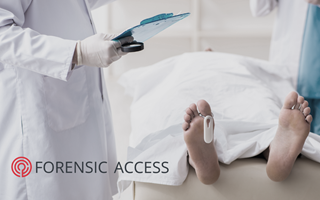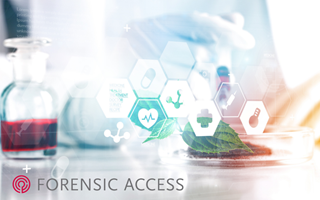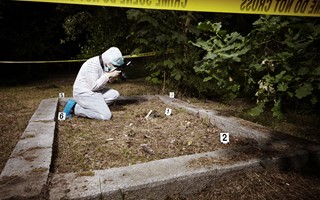Guides September 29, 2021
Finding the right expert witness is a key step in building your defence strategy and can either make or break your case. At Forensic Access we understand how important it is that you get it right, and we have pulled together a list of the most important qualities to look out for when selecting an expert witness.
Ensure the Work is Peer Reviewed and/or Quality Checked
A robust quality system lends credibility in court and strengthens your case. In addition, peer review means you can be confident that the report has been written to the highest level of review. This ensures the robust application of scientific principles, and the accurate interpretation of findings.
All activities conducted in our laboratories, including expert witness reports, are thoroughly documented and peer reviewed by a second competent scientist and/or a member of our casework team. This enhances the credibility of findings from forensic analysis and in turn strengthens your case. It’s a basic scientific principle that replicability enhances credibility, and this makes peer review an essential part of quality management and error mitigation.
Make sure that your Forensic Science Provider is Accredited for Relevant Disciplines
Within the more traditional disciplines of forensic science, such as DNA and other areas of biological testing, accreditation is of paramount importance. In the UK, UKAS is the sole national accreditation body that carries accreditation assessments against the relevant standards – ISO/IEC 17025 and the Forensic Science Regulators (FSR) Codes of Practice and Conduct in the case of forensic science.
Relevant disciplines for which accreditation is vitally important includes traditional forensics, such as those involving bodily fluids and fingerprints. Through accreditation, tests can be considered trustworthy, measurements relied upon, and equipment and scientific processes can be deemed safe and accurate.
At Forensic Access, we’re proud to be accredited to ISO/IEC 17025 and the FSR Codes of Practice and Conduct across Bodily Fluid Analysis, Fingerprint Enhancement and Firearms Examinations. Please see full schedule for details on our accreditation.
Check that your Forensic Science Provider is a Leader in the Field
By now you already know that we have innovative, quality processes… but you should know that we also have top of the range equipment and world class scientists.
In addition, we operate from state-of-the-art laboratories, including a complete ballistics facility and being the only independent fingerprint enhancement laboratory. Within our teams we are constantly looking to further our techniques and be at the cutting edge of science and we are currently the only forensic services provider to utilise the Recover machine.** This piece of cutting edge technology is capable of developing fingerprints on a range of difficult surfaces, such as those that have been exposed to extreme heat, have been cleaned in attempt to conceal evidence, or submerged under water for long periods of time.
** Correct at time of publication
Ensure that your Expert Witness is a Member of Professional Bodies and Associations
Expert witnesses who complete continual personal development (CPD) training, and/or are members of professional bodies and associations, are highly valuable. This additional training ensures that they remain at the top of the game and are always up-to-date with the latest developments in their field.
Your Expert Witness should Operate in a Holistic Setting that’s Ideal for Undertaking Multidisciplinary Investigations
An expert witness who operates in a multidisciplinary setting will be able to bring endless amounts of expertise to your case, thanks to the breadth of services offered by the forensic provider.
Here at Forensic Access, we handle investigations in a single environment, meaning that you won’t have to waste crucial time sending your case requirements to different facilities when it could all be handled under one roof. Our breadth of in-house services, from fingerprints to firearms and biology, combined with our extensive consultancy network, allows us to cover most of the forensic components that could be involved in any given investigation.
Your Expert Witness should be able to Provide Explanation and Interpretation of the Results, with an Impartial Review of the Evidence
An expert witnesses’ competence is integral to disseminating the results of your tests and building your case in a clear manner which can be easily explained to the lay person. It is imperative for your expert to remain impartial and free from bias throughout this process.
We offer quality-led, impartial, and truly independent advice to prosecution, defence and private customers, and have done so for over thirty years. Working collaboratively, we provide advice and investigation services on an individual basis, with the flexibility and means to be completely bespoke in our approach. We don’t just deliver reports to client’s inboxes, we educate clients and walk them through the entire forensic process, all while shaping their defence strategy.
Through our Casework Managers, you will gain access to a pool of over 350 unrivalled experts. Our Casework Management team ensure that both barristers and solicitors alike not only get their questions answered efficiently and effectively, but they understand the issues surrounding a case from a scientific standpoint, giving them the scope to prepare a more effective defence strategy and challenge evidence in the right way.
Find out if your Expert Witness has Undertaken Expert Witness Training and Report Writing Training
A courtroom skills training course, for example, will equip your expert witness with the necessary skills needed for testifying in trials.
Here at Forensic Access, we offer a basic one-day introduction to courtroom training course, designed for expert witnesses who are due to give evidence in court. This course will provide attendees with an overview of the criminal justice system, along with an overview of the roles and responsibilities of an expert witness in criminal proceedings. Attendees will also leave with an understanding of what to expect in court, along with tips and advice for court presentation and dealing with evidence in chief and cross examination.
Make sure that your Expert Witness Displays a Good Awareness of Deadlines and Communication
Above all, your expert witness should be able to meet deadlines and communicate clearly throughout the entire process. This is especially important with tight schedules and turnaround times, of which we know the courts routinely hold experts liable to.
When using a Pathologist, make sure they’re Home Office Registered
Home Office-registered forensic pathologists are independent of the police and coroners, making them the ideal experts for conducting post-mortem examinations in cases of suspicious death.
They must adhere to strict protocols set out by the Home Office, in order to satisfy the requirements and be admitted to the Register. This includes satisfying the committee that the pathologist*:
- is fully registered with the General Medical Council
- has a current License to Practise
- has the legal right to work in the UK
- is of good character
- is solvent
- is not a patient under the Mental Health Act 1983
- has demonstrated current knowledge and understanding of:
- the obligations for disclosure in criminal proceedings, and in particular the Criminal Procedure and Investigations Act 1996 as amended and the obligation to retain, record and reveal;
- the Human Tissue Act 2004 as may be amended;
- the standards required by the Code of Practice and Performance Standards for forensic pathologists in England, Wales and Northern Ireland, (October 2012, or as may be amended) issued by the Forensic Science Regulator, the Home Office and the Royal College of Pathologists (“the college”);
- Coroner’s legislation as it affects the role of the pathologist;
- Coroner’s rules as it affects the role of the pathologist;
- The Criminal Procedure Rules 2012 as amended and in particular Rule 33 (Expert Evidence);
*Source: Pathology delivery board criteria registration, Gov.UK
Our Home Office Registered Pathologists have performed thousands of autopsies collectively since joining the register. While their expertise includes homicides and suspicious deaths, it is not limited to cases involving the deceased. As well as conducting autopsies for both the defence and independent autopsies for local coroners, our pathologists have also provided expert opinion on the causation of injuries in non-fatal cases of wounding.
Pathology investigations can also involve highly specialist skills such as neuropathology and ophthalmology, and with a multitude of expert witnesses at our fingertips (including those specialising in more niche disciplines), we can provide you with the professional opinion that you need.
Forensic Access boasts a world-class team of forensic scientists operating in state-of-the-art facilities. All forensic work is carried out to the highest quality standards.
All defence work is supported by our dedicated Casework Managers who provide end-to-end assistance and coordination. Direct access to our team of scientists helps barristers and solicitors prepare a more effective defence strategy, with many expert witness reports thoroughly documented and peer reviewed.
To find out more about our forensic services, or for a free consultation and quote, fill-in our online contact form or Tel: 01235 77480.


